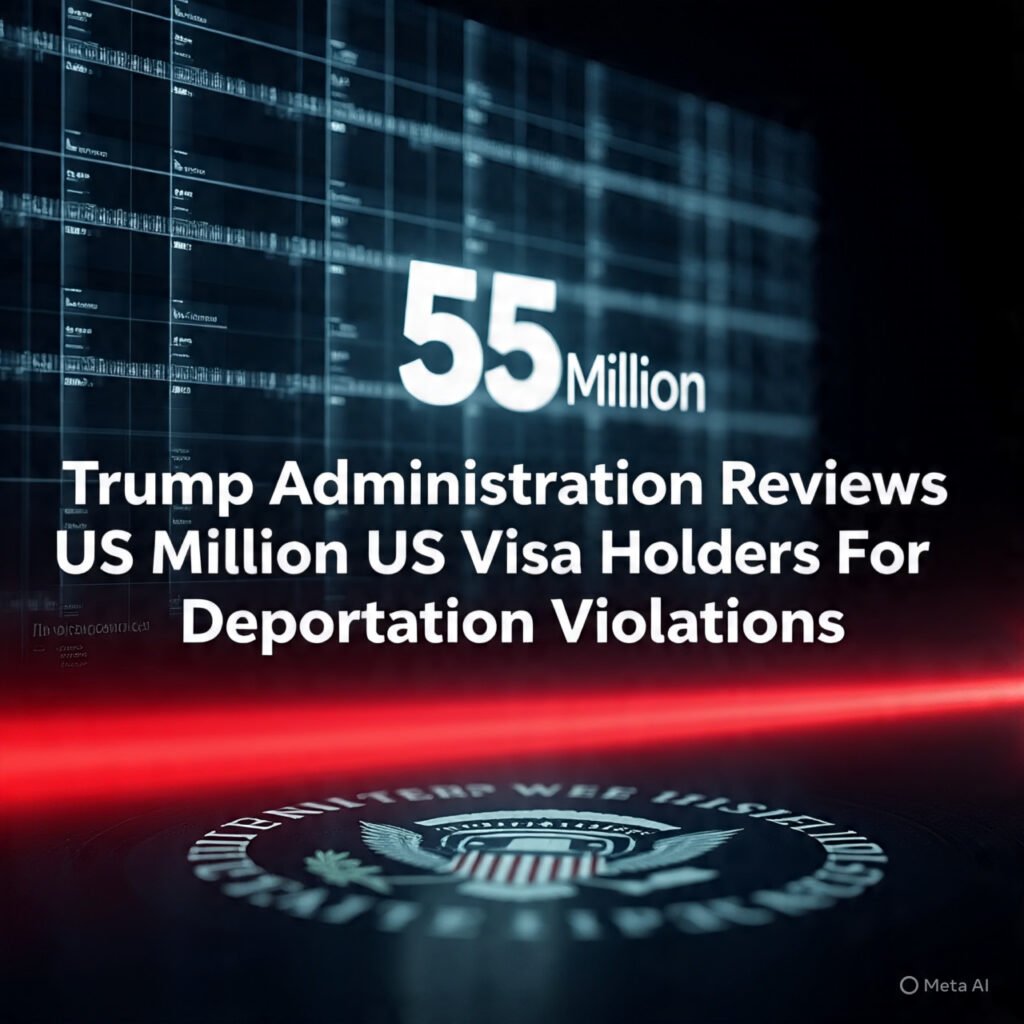The rules governing entry and stay in the United States have always been complex, but under the Trump Administration, the landscape of US immigration and visa enforcement has undergone a transformative and unprecedented shift. In a major escalation of its immigration crackdown, the US Department of State announced a comprehensive review of the records of more than 55 million foreign nationals holding valid US visas—an effort encompassing tourists, students, and temporary workers around the globe.4 This sweeping initiative, centered on a policy of “continuous vetting,” has sent shockwaves through the international community, raising profound concerns about due process, privacy, and the definition of deportation risk.5 This article provides a professional, detailed examination of this policy, its legal basis, the criteria for revocation, and its far-reaching implications for millions of US visa holders.
Table of Contents
The New Frontier of US Immigration Enforcement
Since taking office, the Trump Administration has prioritized national security and tighter border controls, dramatically expanding the scope of immigration enforcement from targeting primarily undocumented migrants to scrutinizing those with legal permission to be in the country.6 The review of 55 million US visa holders is the most explicit manifestation of this expanded mandate.7
The US Department of State confirmed that all individuals holding active non-immigrant visas—including the B-1/B-2 visitor visa, F-1 student visa, and H-1B temporary worker visa—are now subject to “continuous vetting.”8 This is a significant departure from historical practices, where intense scrutiny was largely confined to the initial visa application process.
Continuous Vetting marks a proactive effort by US authorities to identify, after a visa has been issued, any new information that may render the holder ineligible for the document.9 Should such adverse information be discovered, the visa is immediately subject to revocation, and if the individual is present in the United States, they become subject to deportation proceedings by US Immigration and Customs Enforcement (ICE).10
The Grounds for Revocation: Redefining Ineligibility
The State Department has outlined several key indicators of potential ineligibility that trigger a visa revocation.11 These categories expand beyond traditional criminal offenses to include actions or affiliations that the Trump Administration views as threats to national security or public safety.12
The primary grounds for ineligibility under review include:
- Visa Overstays: Remaining in the United States past the authorized period of stay indicated on the Form I-94 record.13
- Criminal Activity: Committing any local, state, or federal crime.14 This increasingly includes even minor infractions or arrests that did not lead to a formal conviction, as authorities are now reviewing vast databases like the FBI‘s National Crime Information Center (NCIC).15
- Threats to Public Safety: Any indication that the individual poses a risk to the security or welfare of the United States.
- Terrorism-Related Activities: Engaging in or providing support to a “terrorist organization” or terrorist activity.16
In a move that has drawn widespread criticism from civil liberties groups, the review process also heavily incorporates the vetting of social media accounts for “anti-American” or “anti-Semitic” ideologies.17 This suggests a broadening of “ineligibility” to include the exercise of free speech and political expression, particularly concerning foreign policy matters.18 The US Citizenship and Immigration Services (USCIS), which handles permanent residency and naturalization requests, has also stated that it is expanding its vetting to include social media, reflecting a whole-of-government approach to screening.19
Tools of the Scrutiny: Data Collection and Technological Reach
The sheer scale of reviewing 55 million records is made possible by leveraging advanced data collection methods and interagency cooperation.
- Interagency Data Sharing: The Department of State is drawing data from multiple federal agencies, including ICE, USCIS, Customs and Border Protection (CBP), and the FBI. This cross-agency collaboration ensures a complete picture of the individual’s legal, criminal, and immigration history within the United States.
- Social Media and Digital Footprint: The administration has expanded its requirements for visa applicants to submit their social media handles, and officials are instructed to scour these accounts for perceived red flags.20 For many travelers, the digital footprint—including past posts, affiliations, and likes—has become a core part of the vetting process.21
- Global Records Integration: The review extends to law enforcement and immigration records in the visa holders’ home countries, alongside any information that comes to light after the initial visa issuance.22
This intensified, continuous, and retroactive review process significantly changes the risk calculus for US visa holders, transforming a previously earned privilege into a conditional permission that can be revoked at any time based on newly discovered or re-evaluated information.23
Implications for US Visa Holders and the Global Community
The Trump Administration’s comprehensive review carries profound implications for millions of individuals and the global standing of the United States.
1. Heightened Risk of Deportation
For the millions of US visa holders currently residing in the United States—including students, temporary workers, and long-term visitors—the risk of sudden visa revocation and subsequent deportation has increased dramatically.24
- No Prior Notice: Visa revocation can happen immediately and without prior warning, often triggered by a minor violation or a flagged social media post.
- Instant Unlawful Status: Once a visa is revoked, the individual immediately loses their legal immigration status, making them subject to arrest and deportation by ICE.25
- Barriers to Future Entry: A visa revocation or prior deportation will likely result in an individual being found inadmissible to the United States for future travel, often triggering the three- and ten-year bars for unlawful presence.
2. Impact on Foreign Talent and Academic Institutions
The review process has disproportionately affected student visa holders, with the State Department confirming the revocation of thousands of F-1 visas in recent months.26 The perceived link between political activism or dissenting views and visa revocation has led to concerns about academic freedom and self-censorship on US university campuses. Similarly, the increased scrutiny on work visas, such as the temporary pause on certain work visas like those for commercial truck drivers, sends a chilling message to foreign professionals and the American companies that rely on them.27
3. Concerns Over Civil Liberties and Profiling
Immigration advocacy groups, such as the American Civil Liberties Union (ACLU), have voiced strong criticism, arguing that the broad and vague criteria—particularly the focus on “anti-American” ideologies—constitute an attack on free speech and risk discriminatory targeting or profiling based on nationality, ethnicity, or religion.28 The expanded use of criminal databases that include dismissed or minor charges is also seen as an overreach that violates the spirit of due process.29
Conclusion
The Trump Administration‘s review of 55 million US visa holders marks a decisive turn in US immigration policy, establishing a pervasive system of “continuous vetting” that extends government scrutiny far beyond the point of entry.30 This sweeping measure, driven by the stated goals of national security and public safety, has created a climate of uncertainty for millions of students, workers, and travelers globally.31 By expanding the grounds for visa revocation to include digital expression and a broad interpretation of deportation risk, the policy challenges traditional notions of due process and places the burden of constant compliance squarely on the individual. The long-term implications for the flow of global talent, international relations, and the United States‘ reputation as a welcoming destination are expected to be substantial.
FAQ Section
Q1: What is the difference between a visa revocation and a finding of inadmissibility?
A1: Visa revocation means the travel document itself is no longer valid. Inadmissibility means the individual is legally barred from entering or remaining in the United States due to a specific violation of US immigration law (e.g., criminal conviction, prior deportation, or unlawful presence). A visa revocation often leads to a finding of inadmissibility if the person overstays or is ordered deported.
Q2: Does this review affect people who are in the United States on the Visa Waiver Program?
A2: The review primarily targets the 55 million foreigners who hold valid non-immigrant visas. Citizens of countries under the Visa Waiver Program (VWP) travel without a visa using the Electronic System for Travel Authorization (ESTA).32 However, VWP travelers are still subject to continuous security screening and can have their ESTA authorization revoked if adverse information is found.33
Q3: What constitutes a “visa violation” under the new policy?
A3: A visa violation includes common issues like visa overstays or unauthorized employment.34 Under the new, expanded policy, it also includes indicators of ineligibility such as any criminal activity, threats to public safety, support for terrorist organizations, or even expressions of “anti-American” views on social media.35
Q4: Can I appeal if my visa is revoked?
A4: Visa revocations are generally administrative decisions made by the Department of State and cannot be directly appealed in a US court. However, individuals inside the United States who are put into deportation proceedings have the right to challenge their removal before an Immigration Judge.
Disclaimer
The information provided in this article is for general informational and educational purposes only. It is based on publicly available news reports and official statements regarding the Trump Administration‘s policy as of the publication date. US immigration laws and policies are subject to change without notice and can be complex. This article does not constitute legal advice. Readers facing visa or deportation concerns should consult a qualified US immigration attorney or the official websites of the US Department of State and the USCIS.
Affiliate Disclosure
This article may contain links to third-party services or resources. Some of these links may be affiliate links, meaning we may earn a small commission if you utilize those services. This comes at no additional cost to you and helps support our work in providing valuable and well-researched content. We only link to resources that we believe are relevant to understanding the complex topic of US immigration.







